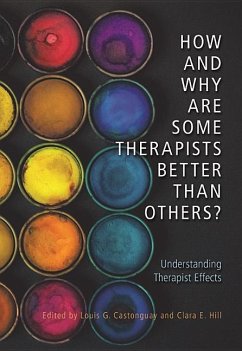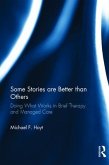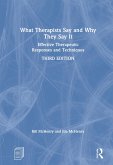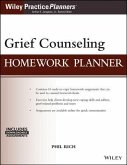How and Why Are Some Therapists Better Than Others?
Understanding Therapist Effects
Herausgeber: Castonguay, Louis G; Hill, Clara E
How and Why Are Some Therapists Better Than Others?
Understanding Therapist Effects
Herausgeber: Castonguay, Louis G; Hill, Clara E
- Gebundenes Buch
- Merkliste
- Auf die Merkliste
- Bewerten Bewerten
- Teilen
- Produkt teilen
- Produkterinnerung
- Produkterinnerung
This book identifies which characteristics make therapists more or less effective in their work and proposes guidelines to improve their effectiveness.
Andere Kunden interessierten sich auch für
![Some Stories Are Better Than Others Some Stories Are Better Than Others]() Michael F HoytSome Stories Are Better Than Others158,99 €
Michael F HoytSome Stories Are Better Than Others158,99 €![Building Your Ideal Private Practice: A Guide for Therapists and Other Healing Professionals Building Your Ideal Private Practice: A Guide for Therapists and Other Healing Professionals]() Lynn GrodzkiBuilding Your Ideal Private Practice: A Guide for Therapists and Other Healing Professionals46,99 €
Lynn GrodzkiBuilding Your Ideal Private Practice: A Guide for Therapists and Other Healing Professionals46,99 €![What Therapists Say and Why They Say It What Therapists Say and Why They Say It]() Bill MchenryWhat Therapists Say and Why They Say It186,99 €
Bill MchenryWhat Therapists Say and Why They Say It186,99 €![Exploring Three Approaches to Psychotherapy Exploring Three Approaches to Psychotherapy]() Leslie S GreenbergExploring Three Approaches to Psychotherapy56,99 €
Leslie S GreenbergExploring Three Approaches to Psychotherapy56,99 €![Grief Counseling Homework Planner, (with Download) Grief Counseling Homework Planner, (with Download)]() Phil RichGrief Counseling Homework Planner, (with Download)75,99 €
Phil RichGrief Counseling Homework Planner, (with Download)75,99 €![Clinician's Guide: Getting Better Bit(e) by Bit(e) Clinician's Guide: Getting Better Bit(e) by Bit(e)]() Janet TreasureClinician's Guide: Getting Better Bit(e) by Bit(e)187,99 €
Janet TreasureClinician's Guide: Getting Better Bit(e) by Bit(e)187,99 €![Complementary and Alternative Medicine for Psychologists Complementary and Alternative Medicine for Psychologists]() Jeffrey E BarnettComplementary and Alternative Medicine for Psychologists97,99 €
Jeffrey E BarnettComplementary and Alternative Medicine for Psychologists97,99 €-
-
-
This book identifies which characteristics make therapists more or less effective in their work and proposes guidelines to improve their effectiveness.
Hinweis: Dieser Artikel kann nur an eine deutsche Lieferadresse ausgeliefert werden.
Hinweis: Dieser Artikel kann nur an eine deutsche Lieferadresse ausgeliefert werden.
Produktdetails
- Produktdetails
- Verlag: American Psychological Association
- Seitenzahl: 356
- Erscheinungstermin: 15. Mai 2017
- Englisch
- Abmessung: 261mm x 184mm x 27mm
- Gewicht: 830g
- ISBN-13: 9781433827716
- ISBN-10: 1433827719
- Artikelnr.: 48134259
- Herstellerkennzeichnung
- Libri GmbH
- Europaallee 1
- 36244 Bad Hersfeld
- gpsr@libri.de
- Verlag: American Psychological Association
- Seitenzahl: 356
- Erscheinungstermin: 15. Mai 2017
- Englisch
- Abmessung: 261mm x 184mm x 27mm
- Gewicht: 830g
- ISBN-13: 9781433827716
- ISBN-10: 1433827719
- Artikelnr.: 48134259
- Herstellerkennzeichnung
- Libri GmbH
- Europaallee 1
- 36244 Bad Hersfeld
- gpsr@libri.de
Edited by Louis G. Castonguay and Clara E. Hill
Contributors
Preface
Introduction
Louis G. Castonguay and Clara E. Hill
Part I: Empirical Foundations
Chapter 1: Therapist Effects, Effective Therapists, and the Law of
Variability
Michael Barkham, Wolfgang Lutz, Michael J. Lambert, and David Saxon
Chapter 2: What Characterizes Effective Therapists?
Bruce E. Wampold, Scott A. Baldwin, Martin grosse Holtforth, and Zac E.
Imel
Chapter 3: Who Works for Whom and Why? Integrating Therapist Effects
Analysis Into Psychotherapy Outcome and Process Research
Michael J. Constantino, James F. Boswell, Alice E. Coyne, David R. Kraus,
and Louis G. Castonguay
Part II: Conceptual Contributions
Chapter 4: Appropriate Responsiveness as a Contribution to Therapist
Effects
William B. Stiles and Adam O. Horvath
Chapter 5: Therapist Presence, Absence, and Extraordinary Presence
Jeffrey A. Hayes and Maria Vinca
Chapter 6: Inner Experience and the Good Therapist
Charles J. Gelso and Andres E. Perez-Rojas
Chapter 7: The Role of the Therapist's Attachment in the Process and
Outcome of Psychotherapy
Bernhard M. Strauss and Katja Petrowski
Chapter 8: The Role of Therapist Skills in Therapist Effectiveness
Timothy Anderson and Clara E. Hill
Chapter 9: The Contributions of Client Culture to Differential Therapist
Effectiveness
Jeffrey A. Hayes, Jesse Owen, and Helene A. Nissen-Lie
Chapter 10: Therapist Negative Reactions: How to Transform Toxic
Experiences
Abraham W. Wolf, Marvin R. Goldfried, and J. Christopher Muran
Chapter 11: Professional Expertise in Psychotherapy
Franz Caspar
Chapter 12: Gaining Therapeutic Wisdom and Skills From Creative Others
(Writers, Actors, Musicians, and Dancers)
Barry A. Farber
Part III: Empirical Contributions
Chapter 13: Effective Therapists in Psychodynamic Therapy for Depression:
What Interventions Are Used and How?
Nadia Kuprian, Harold Chui, and Jacques P. Barber
Chapter 14: Effective and Less Effective Therapists for Generalized Anxiety
Disorder: Are They Conducting Therapy the Same Way?
Soo Jeong Youn, Henry Xiao, Hanjoo Kim, Louis G. Castonguay, Andrew A.
McAleavey, Michelle G. Newman, and Jeremy D. Safran
Chapter 15: Something to Laugh About: Humor as a Characteristic of
Effective Therapists
Sarah Knox, Meghan C. Butler, Dakota J. Kaiser, Graham Knowlton, and Clara
E. Hill
Part IV: Implications and Conclusions
Chapter 16: The Implications of Therapist Effects for Routine Practice,
Policy, and Training
James F. Boswell, David R. Kraus, Michael J. Constantino, Matteo Bugatti,
and Louis G. Castonguay
Chapter 17: Therapist Effects: Integration and Conclusions
Clara E. Hill and Louis G. Castonguay
Index
About the Editors
Preface
Introduction
Louis G. Castonguay and Clara E. Hill
Part I: Empirical Foundations
Chapter 1: Therapist Effects, Effective Therapists, and the Law of
Variability
Michael Barkham, Wolfgang Lutz, Michael J. Lambert, and David Saxon
Chapter 2: What Characterizes Effective Therapists?
Bruce E. Wampold, Scott A. Baldwin, Martin grosse Holtforth, and Zac E.
Imel
Chapter 3: Who Works for Whom and Why? Integrating Therapist Effects
Analysis Into Psychotherapy Outcome and Process Research
Michael J. Constantino, James F. Boswell, Alice E. Coyne, David R. Kraus,
and Louis G. Castonguay
Part II: Conceptual Contributions
Chapter 4: Appropriate Responsiveness as a Contribution to Therapist
Effects
William B. Stiles and Adam O. Horvath
Chapter 5: Therapist Presence, Absence, and Extraordinary Presence
Jeffrey A. Hayes and Maria Vinca
Chapter 6: Inner Experience and the Good Therapist
Charles J. Gelso and Andres E. Perez-Rojas
Chapter 7: The Role of the Therapist's Attachment in the Process and
Outcome of Psychotherapy
Bernhard M. Strauss and Katja Petrowski
Chapter 8: The Role of Therapist Skills in Therapist Effectiveness
Timothy Anderson and Clara E. Hill
Chapter 9: The Contributions of Client Culture to Differential Therapist
Effectiveness
Jeffrey A. Hayes, Jesse Owen, and Helene A. Nissen-Lie
Chapter 10: Therapist Negative Reactions: How to Transform Toxic
Experiences
Abraham W. Wolf, Marvin R. Goldfried, and J. Christopher Muran
Chapter 11: Professional Expertise in Psychotherapy
Franz Caspar
Chapter 12: Gaining Therapeutic Wisdom and Skills From Creative Others
(Writers, Actors, Musicians, and Dancers)
Barry A. Farber
Part III: Empirical Contributions
Chapter 13: Effective Therapists in Psychodynamic Therapy for Depression:
What Interventions Are Used and How?
Nadia Kuprian, Harold Chui, and Jacques P. Barber
Chapter 14: Effective and Less Effective Therapists for Generalized Anxiety
Disorder: Are They Conducting Therapy the Same Way?
Soo Jeong Youn, Henry Xiao, Hanjoo Kim, Louis G. Castonguay, Andrew A.
McAleavey, Michelle G. Newman, and Jeremy D. Safran
Chapter 15: Something to Laugh About: Humor as a Characteristic of
Effective Therapists
Sarah Knox, Meghan C. Butler, Dakota J. Kaiser, Graham Knowlton, and Clara
E. Hill
Part IV: Implications and Conclusions
Chapter 16: The Implications of Therapist Effects for Routine Practice,
Policy, and Training
James F. Boswell, David R. Kraus, Michael J. Constantino, Matteo Bugatti,
and Louis G. Castonguay
Chapter 17: Therapist Effects: Integration and Conclusions
Clara E. Hill and Louis G. Castonguay
Index
About the Editors
Contributors
Preface
Introduction
Louis G. Castonguay and Clara E. Hill
Part I: Empirical Foundations
Chapter 1: Therapist Effects, Effective Therapists, and the Law of
Variability
Michael Barkham, Wolfgang Lutz, Michael J. Lambert, and David Saxon
Chapter 2: What Characterizes Effective Therapists?
Bruce E. Wampold, Scott A. Baldwin, Martin grosse Holtforth, and Zac E.
Imel
Chapter 3: Who Works for Whom and Why? Integrating Therapist Effects
Analysis Into Psychotherapy Outcome and Process Research
Michael J. Constantino, James F. Boswell, Alice E. Coyne, David R. Kraus,
and Louis G. Castonguay
Part II: Conceptual Contributions
Chapter 4: Appropriate Responsiveness as a Contribution to Therapist
Effects
William B. Stiles and Adam O. Horvath
Chapter 5: Therapist Presence, Absence, and Extraordinary Presence
Jeffrey A. Hayes and Maria Vinca
Chapter 6: Inner Experience and the Good Therapist
Charles J. Gelso and Andres E. Perez-Rojas
Chapter 7: The Role of the Therapist's Attachment in the Process and
Outcome of Psychotherapy
Bernhard M. Strauss and Katja Petrowski
Chapter 8: The Role of Therapist Skills in Therapist Effectiveness
Timothy Anderson and Clara E. Hill
Chapter 9: The Contributions of Client Culture to Differential Therapist
Effectiveness
Jeffrey A. Hayes, Jesse Owen, and Helene A. Nissen-Lie
Chapter 10: Therapist Negative Reactions: How to Transform Toxic
Experiences
Abraham W. Wolf, Marvin R. Goldfried, and J. Christopher Muran
Chapter 11: Professional Expertise in Psychotherapy
Franz Caspar
Chapter 12: Gaining Therapeutic Wisdom and Skills From Creative Others
(Writers, Actors, Musicians, and Dancers)
Barry A. Farber
Part III: Empirical Contributions
Chapter 13: Effective Therapists in Psychodynamic Therapy for Depression:
What Interventions Are Used and How?
Nadia Kuprian, Harold Chui, and Jacques P. Barber
Chapter 14: Effective and Less Effective Therapists for Generalized Anxiety
Disorder: Are They Conducting Therapy the Same Way?
Soo Jeong Youn, Henry Xiao, Hanjoo Kim, Louis G. Castonguay, Andrew A.
McAleavey, Michelle G. Newman, and Jeremy D. Safran
Chapter 15: Something to Laugh About: Humor as a Characteristic of
Effective Therapists
Sarah Knox, Meghan C. Butler, Dakota J. Kaiser, Graham Knowlton, and Clara
E. Hill
Part IV: Implications and Conclusions
Chapter 16: The Implications of Therapist Effects for Routine Practice,
Policy, and Training
James F. Boswell, David R. Kraus, Michael J. Constantino, Matteo Bugatti,
and Louis G. Castonguay
Chapter 17: Therapist Effects: Integration and Conclusions
Clara E. Hill and Louis G. Castonguay
Index
About the Editors
Preface
Introduction
Louis G. Castonguay and Clara E. Hill
Part I: Empirical Foundations
Chapter 1: Therapist Effects, Effective Therapists, and the Law of
Variability
Michael Barkham, Wolfgang Lutz, Michael J. Lambert, and David Saxon
Chapter 2: What Characterizes Effective Therapists?
Bruce E. Wampold, Scott A. Baldwin, Martin grosse Holtforth, and Zac E.
Imel
Chapter 3: Who Works for Whom and Why? Integrating Therapist Effects
Analysis Into Psychotherapy Outcome and Process Research
Michael J. Constantino, James F. Boswell, Alice E. Coyne, David R. Kraus,
and Louis G. Castonguay
Part II: Conceptual Contributions
Chapter 4: Appropriate Responsiveness as a Contribution to Therapist
Effects
William B. Stiles and Adam O. Horvath
Chapter 5: Therapist Presence, Absence, and Extraordinary Presence
Jeffrey A. Hayes and Maria Vinca
Chapter 6: Inner Experience and the Good Therapist
Charles J. Gelso and Andres E. Perez-Rojas
Chapter 7: The Role of the Therapist's Attachment in the Process and
Outcome of Psychotherapy
Bernhard M. Strauss and Katja Petrowski
Chapter 8: The Role of Therapist Skills in Therapist Effectiveness
Timothy Anderson and Clara E. Hill
Chapter 9: The Contributions of Client Culture to Differential Therapist
Effectiveness
Jeffrey A. Hayes, Jesse Owen, and Helene A. Nissen-Lie
Chapter 10: Therapist Negative Reactions: How to Transform Toxic
Experiences
Abraham W. Wolf, Marvin R. Goldfried, and J. Christopher Muran
Chapter 11: Professional Expertise in Psychotherapy
Franz Caspar
Chapter 12: Gaining Therapeutic Wisdom and Skills From Creative Others
(Writers, Actors, Musicians, and Dancers)
Barry A. Farber
Part III: Empirical Contributions
Chapter 13: Effective Therapists in Psychodynamic Therapy for Depression:
What Interventions Are Used and How?
Nadia Kuprian, Harold Chui, and Jacques P. Barber
Chapter 14: Effective and Less Effective Therapists for Generalized Anxiety
Disorder: Are They Conducting Therapy the Same Way?
Soo Jeong Youn, Henry Xiao, Hanjoo Kim, Louis G. Castonguay, Andrew A.
McAleavey, Michelle G. Newman, and Jeremy D. Safran
Chapter 15: Something to Laugh About: Humor as a Characteristic of
Effective Therapists
Sarah Knox, Meghan C. Butler, Dakota J. Kaiser, Graham Knowlton, and Clara
E. Hill
Part IV: Implications and Conclusions
Chapter 16: The Implications of Therapist Effects for Routine Practice,
Policy, and Training
James F. Boswell, David R. Kraus, Michael J. Constantino, Matteo Bugatti,
and Louis G. Castonguay
Chapter 17: Therapist Effects: Integration and Conclusions
Clara E. Hill and Louis G. Castonguay
Index
About the Editors








